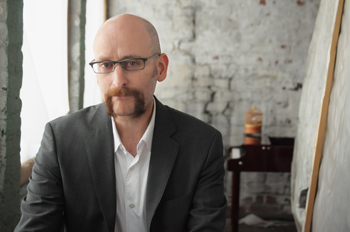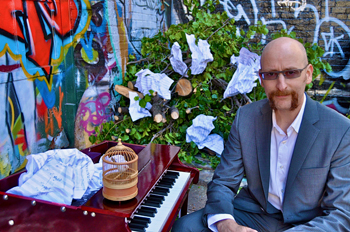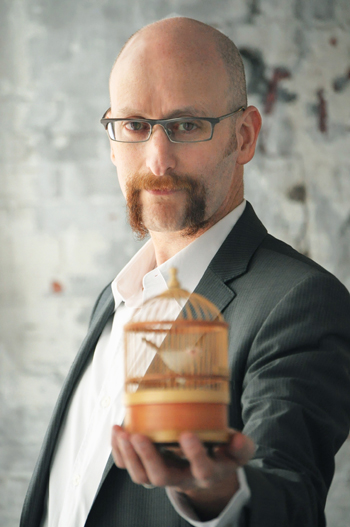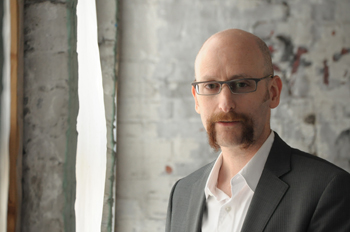PRESS
"An impressive, eclectic composer currently based at the Peabody Institute in Baltimore, David Smooke has written works for any number of noteworthy soloists and ensembles. Tonight, experience his music up close and personal as he performs on the humble but mighty toy piano."
Critic Stephen Brookes in The Washington Post
"Take, for instance, the superb "Hazmats Sextet" by the Peabody Conservatory's David Smooke, which opened the program. Smooke has some of the most uninhibited brain cells around: The work, which he describes as "birds flying through a continually fracturing landscape," evoked a kaleidoscopic sonic universe where anything could happen. It was one of those rare pieces you fall in love with from the get-go. If this is hazardous musical material, send more."
Critic Tim Smith in the Baltimore Sun
"Although varying degrees of emotion were detectable in the articulation of the vocal lines, I can't say that a clear-cut scenario or any specific dramatic events could be discerned in the 45-minute piece.
So, in the end, I decided it was akin to that big egg in Charleston -- there may or may not have been something deep inside, but, either way, the surface was cool enough.
Smooke has acknowledged Philip Glass as an early influence, which could be traced in the pulsating patterns of "Criminal Element." I thought of Morton Feldman, too; there is a lot of soft and static music.
The singers -- sopranos Elisabeth Halliday and Bonnie Lander, baritone Robert Maril -- were at their most technically secure in reflective passages, but they handled more aggressive bits with plenty of spirit. Each vocalist also ably tackled the unusual instrumental assignments required along the way -- a micro-tuned ukulele, a melodica and what I think was a dulcimer (used with particularly haunting effect in the final portion of the work).
The primary instrumental complement in the score is a string quartet, called up to produce quite a variety of subtle sounds. The West End String Quartet performed this role admirably.
However "Criminal Element" is ultimately classified genre-wise, it adds up to a highly creative, absorbing experience."
Steve Smith in The New York Times
"Timothy Andres, on piano, gave a kinetic account of David Smooke’s bustling, percussive “Requests.”"
Tom Huizenga in The Washington Post
“Fortunately, the ensemble roared back after intermission with two strong pieces and performances. David Smooke’s “Nutshell Studies of Unexplained Death,” inspired by crime scene dioramas, is essentially a mischievous, 15-minute concerto for toy piano. The composer sat at his tiny blood-red instrument, producing a Pandora’s box of eerie sounds by bowing (threading a single string through its guts) and pawing the insides, as if scratching an itch. A foghorn tolled eerily in the bassoon, while winds and strings creaked.”
Stephen Brookes in The Washington Post
"Organized by the Peabody Conservatory’s David Smooke, the seven-member collective is dedicated to experimental music in all its glories, and on Saturday night at Catholic University’s Ward Recital Hallthey put on a recital that showcased established composers, provocative newcomers and an improvisation by the entire ensemble that was absolutely riveting.
Smooke is one of the more engaging and unpretentious composers around, and his “21 Miles to Coolville” was a playful work built around a car trip to the actual town of Coolville, Ohio."
Rev. Elgaroo Brenza in What Weekly
"You may not be aware of the small, intricately-knit collection of Peabody misfits which is ambitiously creeping into the Baltimore experimental improv underground, but you’ll be glad you turned up for any future performances by LotUS (League of the Unsound Sound). This is where modern experimental composition meets untethered improvisational music. The alchemy breeds a concoction both unique in its flavor and approach, and explosive in its potential to gestalt new Baltimore sound."
Thomas Deneuville in I Care If You Listen
"Timo Andres performed David Smooke’s Requests for solo piano, a tense piece incorporating elements of Jazz (a devilish, gut-gripping bassline) in between quieter episodes where Andres was sometimes playing chords while knocking on the piano with his left hand…"
Chris McGovern in The Glass
"a great solo-piano piece by David Smooke called Requests"
Critic Tim Smith in the Baltimore Sun
"David Smooke's Requests was also performed in the presence of the composer. This work from 2003, written for Briggs, exploits her technical elan and gets additional color from having her tap on the instrument. A lot of kinetic action is packed into this short and sweet score. Other highlights of hefty program included two more 2003 items: Nico Muhly's Quiet Music, with its tapestry of thick, yet ever-lyrical, chords; and Bruce Stark's elegant, shimmering Waltz."
Rob Deemer in Sequenza21
"Thursday evening was a good night for new music, as a new chamber ensemble formed by Baltimore-based composer David Smooke gave its maiden voyage performance at Mercyhurst College in Erie, Pennsylvania to an enthusiastic and supportive audience. [...] The concert came to a bombastic close with my favorite work of the evening, David Smooke’s work for two pianos and two percussion, Hurricane Charm."
From the blog "wellsung"
"There was a lot to like in the first half. David Smooke creates a rich and involving sound world in his Hazmat Sextet (listenhere)--a kind of impromptu Rite of Spring carried out by the birds of an unidentified planet."
John Chacona in the Erie Times, previewing the premiere concert of LotUS
“Good thing, because Smooke does quite a bit. The one-time punk and industrial rock musician teaches at Baltimore’s Peabody Conservatory. He composes and plays [toy] piano. He’s also one of the founders of the League of the Unsound Sound, a cooperative contemporary music ensemble that performs for the first time in public tonight […].
Jody Redhage as Quoted in Musicworks Issue #102
“David clearly has a lot of experience working with both vocalists and cellists, and therefore both parts were challenging but idiomatic, and worked together beautifully.”
From the University of Chicago Magazine
“The final product […] bounced from dark, jolting chords to soft, dreamy tones. At time menacing and frantic, at others somber and mysterious […]. After the peaks and valleys, it ended quietly, like a violent wave subsiding, gently returning to the sea.”



